Knife blocks may seem like the most convenient storage option for your kitchen knives, with their classic and aesthetic design. They are often marketed as an ideal way to store knives, providing easy access and protection. The question remains whether they are the best way to preserve the sharpness of your blades.
While wooden knife blocks may seem like an easy and traditional option, they can harm your knives’ sharpness. The sliding motion of inserting and withdrawing knives from the slots can quickly dull the edge. This is because the sliding process wears down the sharpness of the blade.
Also, storing knives in wood blocks can create a breeding ground for yeast, mold, and other germs, posing a hygiene risk to your kitchen.
Throughout this article, we’ll explore why storing knives in a knife block might not be the best idea. Let’s find out some essential information about this topic.
Jump to Section
Reasons Not to Store Your Knives in a Knife Block
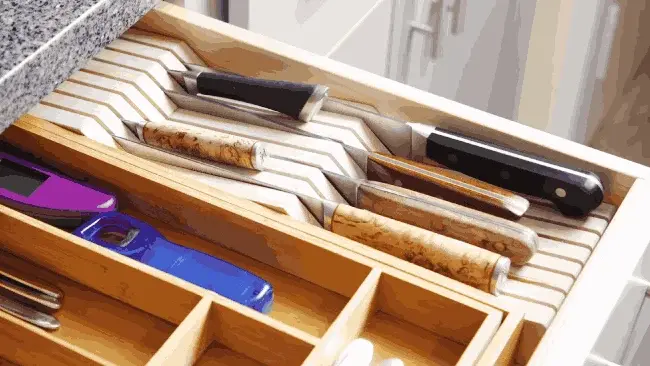
Storing knives in a knife block may seem convenient, but it’s not the best idea for the following reasons:
- Dull blades
- Knife damage
- Hygiene concerns
- Limited slot sizes
- Inefficiency in knife selection
- Difficulty in cleaning
- Counter space
1. Dull Blades
Using a knife block can dull the blades due to constant friction with the wood. When you store your knives in a knife block, every time you slide the blade in and out of the slot, it comes into contact with the wood.
This continuous contact can cause the blade to lose its sharpness over time. The friction between the blade and the wood can wear down the edge, requiring you to hone and sharpen your knives more frequently. Not only is this inconvenient, but it can also reduce the lifespan of your knives.
2. Knife Damage
If you keep your knives in a wooden knife block, know the potential for knife damage caused by improper storage. Wooden knife blocks have specific slots for different knife shapes and sizes, and forcing a knife into the wrong slot can damage the blade, tip, or handle. This damage can be quite costly to repair or replace.
When a knife is improperly stored, the blade can come into contact with other knives or the sides of the slot, resulting in nicks, scratches, or chipping. Also, inserting the knife with excessive force or at the wrong angle can cause the blade to bend or warp over time.
3. Hygiene Concerns
Wooden knife blocks can be a breeding ground for these harmful microorganisms, especially if they aren’t properly maintained. The porous nature of the wood allows moisture and food particles to seep in, creating an ideal environment for bacteria and mold to thrive.
4. Limited Slot Sizes
When purchasing a knife block, carefully consider the dimensions of the slots provided. Some blocks may only have slots designed for smaller knives, such as paring or utility knives, while larger knives, like chef’s or bread knives, may not fit properly.
This can be frustrating, as it limits your options and may require you to find alternative storage solutions, such as magnetic strips for your larger knives. Also, forcing a larger knife into a smaller slot can damage the knife and the block itself.
5. Inefficiency in Knife Selection
While a classic wood knife block may look sleek on your countertop, it can hinder your efficiency when choosing the right tool. With knives stored horizontally in slots, you may visually inspect each one to find the blade you need, which can be frustrating and time-consuming.
6. Difficulty in Cleaning
Cleaning inside a wooden knife block can be challenging due to the narrow slots and hard-to-reach areas. The accumulation of crumbs, dust, and debris in these slots affects the cleanliness and poses potential hygiene concerns. It’s crucial to keep the knife block clean to maintain the quality and longevity of your knives.
7. Counter Space
Counter space is a crucial commodity in any kitchen, and professional cooks know that every inch counts. Knife blocks, while useful for storing and organizing sharp blades, can quickly become a bulky and inconvenient addition to your countertops. This can be especially troublesome in smaller kitchens, where space is premium.
Alternative Knife Storage Ideas Instead of Knife Blocks to Prevent Dullness
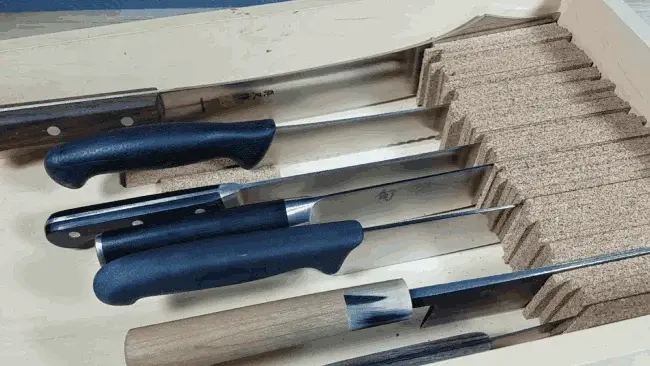
Consider several options if you’re looking for alternative knife storage options that can prevent dullness.
1. Magnetic Knife Strips
You should consider switching to magnetic knife strips instead of wooden knife blocks to prevent your knives from dulling. Magnetic knife strips provide a safe and efficient way to store your knives.
By securely holding the knives, the strips prevent any unnecessary contact between the blades, keeping them sharp for longer periods. Also, magnetic knife strips allow you to easily see and access your knives, making them a practical and stylish alternative to traditional knife blocks.
2. Drawer Knife Trays
Consider using drawer knife trays as an alternative to knife blocks to prevent dullness. These trays are designed to fit inside drawers and have slots or compartments that securely hold your knives.
Keeping your knives in a tray protects them from getting scratched or damaged, which can lead to dullness over time. The slots or compartments also help keep the blades separated, preventing them from colliding and resulting in dullness.
3. Wall-Mounted Knife Racks
Hang your knives on a wall-mounted knife rack to keep them easily accessible and prevent dullness. A wall-mounted knife rack isn’t only a practical storage solution but also adds a touch of style to your kitchen decor.
By hanging your knives on a rack, you avoid the risk of them getting lost in a messy drawer or accidentally causing injury when reaching for them. Also, the slots or hooks on the rack securely hold the knives in place, preventing them from knocking into each other and becoming dull.
4. Knife Bags or Rolls
A knife bag or roll is a convenient and practical storage solution for those who want to keep their knives safe and organized. These portable storage options typically have individual pockets or slots for each knife, preventing them from rubbing against each other and causing the dullness.
Keeping your knives in a bag or roll can protect the blades from damage and accidents. Also, these bags or rolls offer easy transportation, allowing you to bring your knives to different locations without any hassle.
5. Under-Cabinet Knife Storage
You can save countertop space and prevent dullness by installing a knife storage rack underneath your upper cabinets, allowing easy access to your knives.
With an under-cabinet knife storage rack, you eliminate this problem. The rack securely holds your knives vertically, preventing any unnecessary contact that can lead to dullness. Also, the rack keeps your knives within reach, making it convenient to grab the ones you need while cooking.
6. Knife Guards or Blade Covers
Use knife guards or blade covers to protect your knives and prevent them from becoming dull. Knife guards or blade covers are essential for keeping your knives in shape. They’re typically made of plastic or silicone and are designed to fit snugly over the blade, providing a protective barrier.
When storing your knives, these guards help to prevent the blades from colliding with other utensils or surfaces, which can cause them to become dull. Also the guards also protect your fingers from accidental cuts when reaching into the drawer or handling the knives.
FAQ’s: Do Knife Blocks Dull Knives
Do universal knife blocks damage knives?
Universal knife blocks won’t damage your knives. The design of these knife blocks ensures that the blades remain sharp and intact.
Unlike traditional knife blocks with slots that can cause dulling and wear on the blade edges, universal knife blocks use rods to hold the knives in place securely. These rods don’t create friction against the blades, preventing potential damage.
The knife-friendly nature of universal knife blocks is due to the spacing and material of the rods. They’re typically made of a soft material like plastic or silicone, cushions the knives and keeps them in optimal condition.
Do wood knife blocks need frequent cleaning?
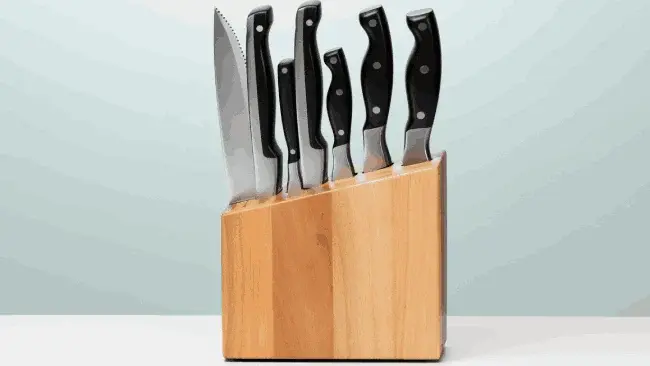
You must frequently clean your wooden knife block to maintain its hygiene. When cleaning your wood knife block, remove all the knives and wipe down the interior with a damp cloth. Even if you don’t see any mold on the outside, you should clean your knife block about once a month.
Mold can grow on the block’s surface, harming your health and transferring to your knives. The cleaning process may take some time, but it is worth knowing that you’re keeping your kitchen tools clean and safe.
If you find the cleaning process too cumbersome, consider investing in a magnetic knife strip, which is much easier to clean and maintain.
Conclusion
Storing knives in a wood knife block may not be the best idea if you want to keep them sharp. The constant friction and contact with wood can cause the blades to lose their sharpness over time, and the narrow slots can damage the blade, tips, or handles.
Instead, consider alternative storage options, such as magnetic strips or knife rolls, which can help prevent these storage-related issues and offer more flexibility and convenience.
Remember, maintaining the sharpness of your knives is crucial for safe and efficient food preparation, so choose your storage option wisely.


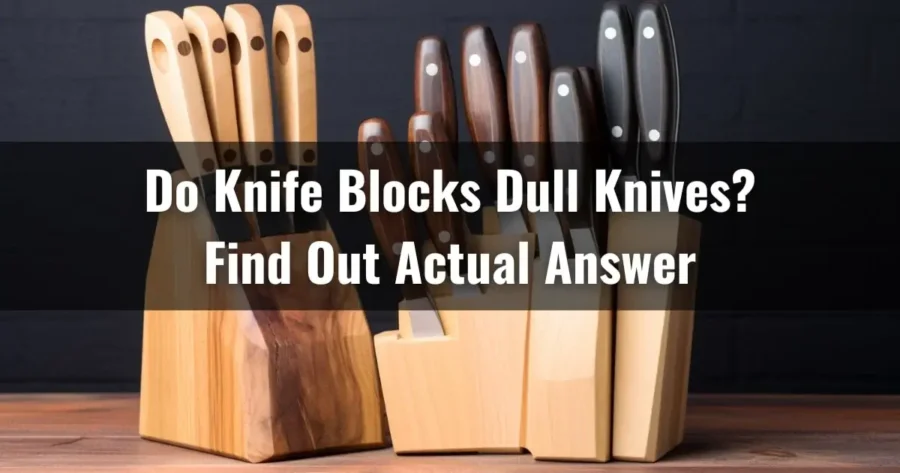
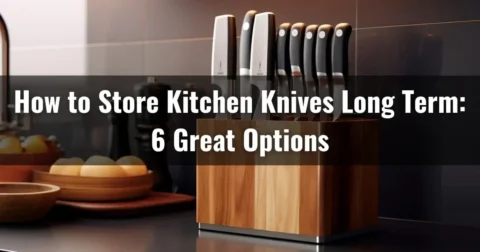

![Knife Block vs Magnetic Strip: 10 Differences [Explained]](https://tidytango.com/wp-content/uploads/2023/10/Knife-Block-vs-Magnetic-Strip-10-Differences-Explained-480x252.webp)